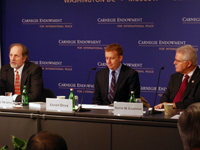Registration
Thank you!
You will receive an email confirming your registration.
As the world's predominant political, economic, and military force, the United States faces a significant challenge in responding to China's rising power and influence, especially in Asia. This challenge will require more effective U.S. policies and a reassessment of America's fundamental strategic assumptions and relationships.
Carnegie's Michael Swaine discussed his new book America's Challenge. He was joined by David M. Lampton of Johns Hopkins University, who provided comments. Geoff Dyer of the Financial Times moderated.
U.S.-China Relations: The Most Important Bilateral Relationship
- Most Important Relationship: Swaine characterized the U.S.-China as the most important bilateral relationship in the world today. The potential for economic, political, and military tensions between these two powers makes the management of this relationship critical.
- Changes Over Time: The relationship has changed fundamentally since the 1970s. The growing predominance of global and multilateral issues has only complicated an already delicate relationship.
- Basis Needed: Both sides need a conceptual and functional basis for dealing with such global transnational problems and for continued stability in their relationship.
U.S. Policy
- Engagement and Hedging: Swaine referred to the long-held description of U.S. policy toward China as defined by two wings: engagement and hedging. Swaine pointed out that the opposite ends of intensive economic and diplomatic engagement and hard power military hedging against a hostile China are actually bound together and are not clearly demarcated; each is some balance of both parts.
- Striking a Balance: Changing dynamics in the bilateral relationship have made it hard for Washington to get the balance between engagement and hedging right, Swaine continued. He argued that the present balance is not stable, and needs to be changed.
- Potential Conflict: Swaine pointed out that China’s growing influence is not a global security concern; Beijing is focused on Asia and the Western Pacific. However, China’s growing assertiveness in the region is becoming a cause for tension in its relationship with Washington, given the historic U.S. role in the region.
- U.S. Policy of Predominance: The United States is eager to maintain predominance in East Asia to guarantee regional security, and the U.S. has been heavy handed in handling maritime issues, focusing its emphasis on hedging rather than engagement. This is unnecessarily polarizing the region, Swaine asserted.
Divergent Views about Stability and the Distribution of Power
- Lack of Agreement: Swaine pointed out that both Beijing and Washington need an agreement in areas of disagreement that also covers the issue of values and global norms such as sovereignty, interstate disputes, political rights, and voting power in international institutions.
- An Unstable Equilibrium: Lampton asserted that China’s growing power, globalization, and transnational problems create an unstable equilibrium in the U.S.-China relationship.
- Either Negotiation or Conflict: There are three major areas where the United States will either have to negotiate or come into conflict with China, Lampton said. These include:
- The U.S. security relationship with Taiwan and cross straits relations;
- Norms governing maritime, political, economic, and security ‘spaces’ where the United States traditionally had dominance, as China expands its influence
- U.S. outer space strategy, which the United States still has unquestioned dominance.
Hard Thinking about the Future
- A Diffuse Global Power Structure: Swaine argued that as global power grows more diffuse, Washington will not be able to exert power in the same way.
- Predominance: Maritime issues require more thinking on the nature of long term U.S. interests, Swaine said. Washington needs to ask itself what are the critical, irreducible U.S. positions and what interests could be exchanged quid pro quo. It also needs to consider what its policy will be if China does not back down and whether it wishes to escalate the situation or try a form of about accommodation, he added.
- Status Quo: “The status quo will not suffice,” Swaine asserted. The United States needs to evaluate its comprehensive national power and determine what global commitments it can realistically sustain. He added that U.S. global power is going to decline in relative terms.
- Creating Change: Lampton pointed out that many of the areas where U.S. negotiation with China is most necessary are difficult, if not impossible, to resolve. He argued that ultimately, Washington is changing its Asia policy and not moving in the direction Swaine suggests. Lampton questioned whether the United States will be able to strike a balance with Beijing, given China’s rapid growth and U.S. relative decline, and whether U.S. domestic politics will permit the necessary policy changes.
- Difficulties in Shifting Policy: A reevaluation of the U.S. approach to China might pose a number of problems, Lampton added, including how U.S. allies will react to a policy of diminished U.S. dominance in the region. He added that changes within China also raise questions of whether weaker leaders and a stronger society can maintain control.? Third party regional actors are also plentiful and could complicate matters.
